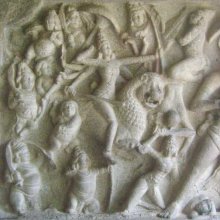Shrivatsa, Śrīvatsa, Śrīvatsā, Shri-vatsa: 33 definitions
Introduction:
Shrivatsa means something in Buddhism, Pali, Hinduism, Sanskrit, Jainism, Prakrit, the history of ancient India, Marathi. If you want to know the exact meaning, history, etymology or English translation of this term then check out the descriptions on this page. Add your comment or reference to a book if you want to contribute to this summary article.
Shrivatsa has 33 English definitions available.
The Sanskrit terms Śrīvatsa and Śrīvatsā can be transliterated into English as Srivatsa or Shrivatsa, using the IAST transliteration scheme (?).
Images (photo gallery)
Languages of India and abroad
Sanskrit dictionary
[Deutsch Wörterbuch]
Source: Cologne Digital Sanskrit Dictionaries: Böhtlingk and Roth Grosses Petersburger WörterbuchŚrīvatsa (श्रीवत्स):—m.
1) Bez. einer best. Figur (abgebildet in [morgenländischen Gesellschaft 6, 94.] [Colebrooke 2, 210.] [Lot. de Lassen’s Anthologie b. l. 625]), insbes. ein Haarwirbel von dieser Form auf Viṣṇu’s (Kṛṣṇa’s) Brust [Hemacandra’s Abhidhānacintāmaṇi 222.] [Halāyudha 1, 27.] [Oxforder Handschriften 183], b, [1 v. u.] [Mahābhārata 1, 2507. 3, 10960] (hier neutr.). [12900. fg. 15840. 15851. 5, 2955. 3590] (bei andern göttlichen Wesen). [12, 13294. 13, 6808.] [Harivaṃśa 4446.] [Rāmāyaṇa 6, 102, 26] (lakṣaṇaḥ als comp. zu lesen). [7, 37, 3, 12.] [Raghuvaṃśa 10, 10. 17, 29] (zugleich Form eines Gemachs). [Kumārasaṃbhava 7, 43.] [Varāhamihira’s Bṛhajjātaka S. 33, 10] (śrīvṛkṣa v. l.). [43, 3. 58, 31.] śrīvatsāṅka 45 (jina). [94, 2] (in der gleichlautenden Stelle [79, 21] śrīvṛkṣa). [WEBER, Rāmatāpanīya Upaniṣad 306.] [KṚṢṆAJ. 274. 289. 295. 303.] [Bhāgavatapurāṇa 3, 8, 28. 16, 21. 19, 34. 5, 3, 3. 6, 8, 20] (dhāman). [8, 4, 19.] [PAÑCAR. 3, 11, 19.] svastikanandyāvartavardhamānasaṃsthānakeśa [Rgva tch’er rol pa ed. Calc. 122, 20. fg. 334, 17.] [WILSON, Sel. Works 2, 15. fg.] das Zeichen des 10ten Arhant's [Hemacandra’s Abhidhānacintāmaṇi 47.] bhṛt m. ein N. Viṣṇu’s [Hemacandra’s Abhidhānacintāmaṇi 219.] —
2) ein N. Viṣṇu’s [Hemacandra’s Abhidhānacintāmaṇi 218.] [Halāyudha 1, 24.] —
3) ein Gang in einer Mauer von einer best. Form [Trikāṇḍaśeṣa 2, 10, 9.] —
4) the name of one of the lunar asterisms [Asiatick Researches 9, 366] nach [Haughton.] — Vgl. śrīvṛkṣa .
Sanskrit, also spelled संस्कृतम् (saṃskṛtam), is an ancient language of India commonly seen as the grandmother of the Indo-European language family (even English!). Closely allied with Prakrit and Pali, Sanskrit is more exhaustive in both grammar and terms and has the most extensive collection of literature in the world, greatly surpassing its sister-languages Greek and Latin.
See also (Relevant definitions)
Starts with: Shrivatsa acarya, Shrivatsa sharman, Shrivatsa shrinivasa acarya, Shrivatsa vyasa, Shrivatsabhrit, Shrivatsadharin, Shrivatsaki, Shrivatsakin, Shrivatsalanchana, Shrivatsalanchhana, Shrivatsamudra, Shrivatsamuktikanandyavartalakshitapanipadatala, Shrivatsamuktikanandyavartalakshitapanipadatalata, Shrivatsanka, Shrivatsanka mishra, Shrivatsapinyaka, Shrivatsasvastikanandyavartalalitapanipada, Shrivatsavakshas, Shrivatsavihara.
Ends with: Hridayashrivatsa.
Full-text (+59): Shrivatsalanchana, Shrivatsanka, Shrivatsabhrit, Shrivatsakin, Shrivatsamuktikanandyavartalakshitapanipadatalata, Shrivatsadharin, Shrivatsapinyaka, Shrivaccha, Shrivrikshaka, Ashtamangala, Siddhantaratnamala, Shrivatsa vyasa, Shrivatsa sharman, Shrivatsa shrinivasa acarya, Shrivatsa acarya, Vatsanka, Bhramarapadala, Shitalanatha, Ashtamangalika, Cidgaganacandrika.
Relevant text
Search found 69 books and stories containing Shrivatsa, Śrī-vatsa, Śrīvatsa, Sri-vatsa, Śrīvatsā, Shri-vatsa, Srivatsa, Śrī-vatsā; (plurals include: Shrivatsas, vatsas, Śrīvatsas, Śrīvatsās, Srivatsas, vatsās). You can also click to the full overview containing English textual excerpts. Below are direct links for the most relevant articles:
Garga Samhita (English) (by Danavir Goswami)
Verse 2.7.26 < [Chapter 7 - Kidnapping of the Calves and Cowherd Boys]
Verse 1.2.56 < [Chapter 2 - Description of the Abode of Śrī Goloka]
Verse 2.9.25 < [Chapter 9 - Brahmā’s Prayers]
Tiruvaymoli (Thiruvaimozhi): English translation (by S. Satyamurthi Ayyangar)
Pasuram 3.4.3 < [Section 4 - Fourth Tiruvaymoli (Pukalum nal oruvan)]
Pasuram 5.2.8 < [Section 2 - Second Tiruvaymoli (Polika Polika)]
Cidgaganacandrika (study) (by S. Mahalakshmi)
Verse 312 [Kālidasa’s Cidgaganacandrikā benefits entire mankind] < [Chapter 4 - Fourth Vimarśa]
Shat-cakra-nirupana (the six bodily centres) (by Arthur Avalon)
Jainism in Odisha (Orissa) (by Ashis Ranjan Sahoo)
Jaina Antiquities at Udayagiri Hills (Khordha) < [Chapter 3: Survey of Jaina Antiquities in Odisha]
Jain symbols in Art < [Chapter 5]
Jaina Antiquities at Khandagiri Hills (Khordha) < [Chapter 3: Survey of Jaina Antiquities in Odisha]




